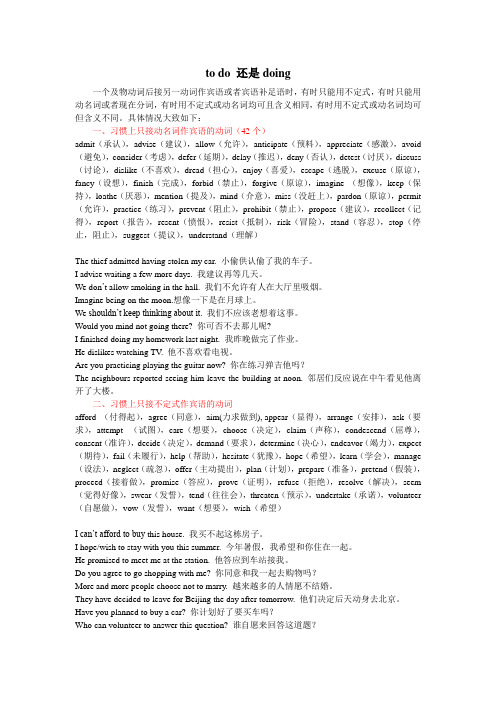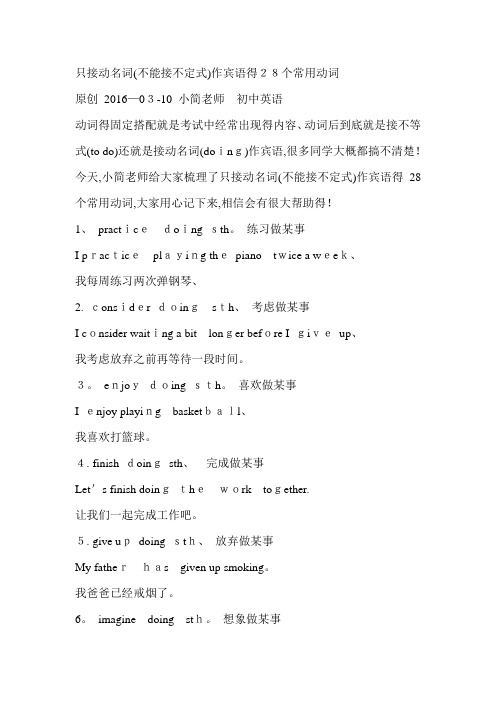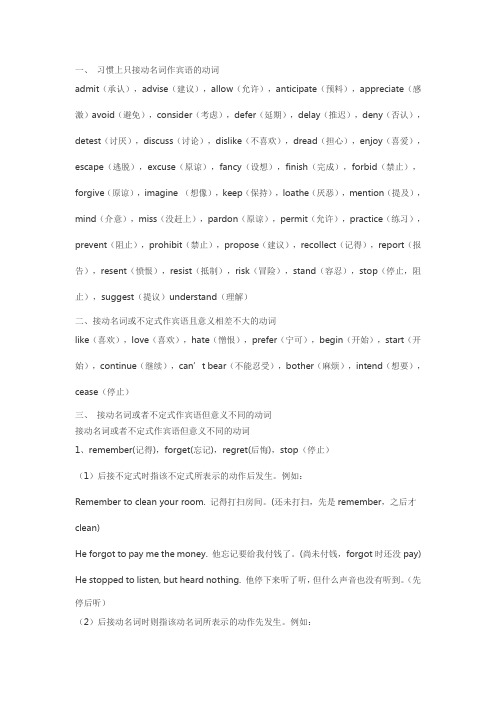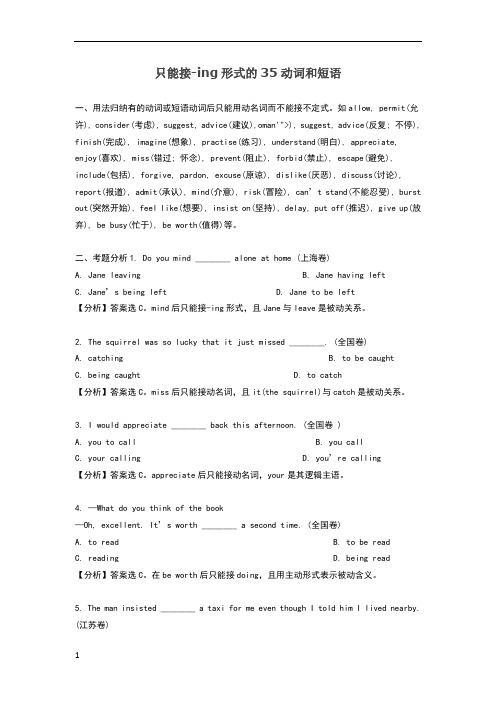只接动名词的动词
to do还是dong

to do 还是doing一个及物动词后接另一动词作宾语或者宾语补足语时,有时只能用不定式,有时只能用动名词或者现在分词,有时用不定式或动名词均可且含义相同,有时用不定式或动名词均可但含义不同。
具体情况大致如下:一、习惯上只接动名词作宾语的动词(42个)admit(承认),advise(建议),allow(允许),anticipate(预料),appreciate(感激),avoid (避免),consider(考虑),defer(延期),delay(推迟),deny(否认),detest(讨厌),discuss (讨论),dislike(不喜欢),dread(担心),enjoy(喜爱),escape(逃脱),excuse(原谅),fancy(设想),finish(完成),forbid(禁止),forgive(原谅),imagine (想像),keep(保持),loathe(厌恶),mention(提及),mind(介意),miss(没赶上),pardon(原谅),permit (允许),practice(练习),prevent(阻止),prohibit(禁止),propose(建议),recollect(记得),report(报告),resent(愤恨),resist(抵制),risk(冒险),stand(容忍),stop(停止,阻止),suggest(提议),understand(理解)The thief admitted having stolen my car. 小偷供认偷了我的车子。
I advise waiting a few more days. 我建议再等几天。
We don’t allow smoking in the hall. 我们不允许有人在大厅里吸烟。
Imagine being on the moon.想像一下是在月球上。
We shouldn’t keep thinking about it. 我们不应该老想着这事。
动名词不定式(可以接不定式或动名词的动词大集合)

后只能接动名词作宾语的动词admit 承认/ advise 建议/ allow 允许/ appreciate 感激/ avoid 避免/ consider 考虑/ delay 推迟/ deny 否认/ discuss 讨论/ dislike 不喜欢/ enjoy 喜爱/ escape 逃脱/ excuse 原谅/ fancy 设想/ finish 完成/ forbid 禁止/ forgive 原谅/ imagine 想像/ keep 保持/ mention 提及/ mind 介意/ miss 没赶上/ pardon 原谅/ permit 允许/ practise 练习/ prevent 阻止/ prohibit 禁止/ put off 推迟/ report 报告/ risk 冒险/ stop 停止/ suggest 建议/ carry on 继续/ can’t help 禁不住/ feel like 想要/ give up 放弃/ keep on 继续/ put off 推迟/ set about 开始,着手/ object to 反对/ insist on 坚持/ pay attention to 注意/ stick to 坚持/ get down to 开始认真做/ look forwards to 期盼/ be [get] used to 习惯于/ lead to 导致/ be devoted to 致力于,专用于,后只能接不定式作宾语的动词afford 负担得起/ arrange 安排/ ask 要求/ care 想要/ choose 决定/ decide 决定/ demand 要求/ determine 决心/ expect 期待,预计/ help 帮助/ hesitate 犹豫/ hope 希望/ long 渴望/ manage 渴望设法/ offer 主动提出/ plan 计划/ prepare 准备/ pretend 假装/ promise 答应/ refuse 拒绝/ want 想要/ wish 希望,既可接动名词也可接不定式作宾语但意义不同的动词(1) remember(记得),forget(忘记),regret(后悔)后接不定式指该不定式所表示的动作还未发生,后接动名词(有时可用完成式),则指该动名词所表示的动作已经发生。
常用来接动名词做宾语的动词

常用来接动名词做宾语的动词哪些动词或短语接动名词是测试中的重点。
往往可分以下两种,现总结如下:①下列动词后常常只能接动名词作宾语:acknowledge承认,自认;advise建议;admit 承认;allow;avoid避免;appreciate感激;bar禁止;cease 停止;consider考虑;confess坦白;delay 延期;deny否认,抵赖;dislike不喜欢,讨厌;enjoy喜欢; escape逃跑;excuse 宽恕;fancy幻想,爱好, imagine想象;include包括、包含;finish完成; complete 完成;forbid禁止;forgive宽恕;imagine想象;mention提到;mind介意、反对; miss错过,想念;keep保持;pardon; 宽恕,原谅practise练习;permit 许可;risk冒险;resist忍住、不屈服于;suggest提议;postpone=put off 延期,推迟;understand理解;favour造成,偏爱; involve卷入,产生某种必然的结果;recall回想;resume恢复;quit放弃、停止;report报告; tolerate 忍受,容忍; hinder耽搁、妨碍;resume继续、重新开始;recommend建议、劝告;等等。
例如:1.In some countries people favor staying together even though there is much more space.在一些国家,尽管有很多空地,人们还是愿意住在一起。
2.With apples at 25 cents a pound, we couldn't resist taking four pounds.由于苹果25分一磅,我们禁不住买了四磅。
3.My mother dislikes seeing you with me. =My mother dislikes our being together.我母亲不喜欢看到你我在一起。
哪些动词后面只能跟动名词

哪些动词后面只能跟动名词?哪些动词后面只能跟不定式?哪些动词后面动名词和不定式都能跟但意思不一样?语法书上也有列举了几十个词像这些 admit, allow, avoid, consider, enjoy, escape, finish, mind, miss, dislike, delay, mean, imagine, permit, practice, resist, risk, suggest, feel like, can’t help, put off, can not understand, give up 请再列举些最佳答案以下动词后,只能跟不定式作宾语 afford (付得起),agree(同意),aim(力求做到), appear(显得),arrange(安排),ask(要求),attempt (试图),care(想要),choose(决定),claim(声称),condescend(屈尊),consent (准许),decide(决定),demand(要求),determine(决心),endeavor (竭力),expect(期待),fail(未履行),help(帮助),hesitate(犹豫),hope(希望),learn(学会),manage(设法),neglect(疏忽),offer(主动提出),plan(计划),prepare(准备),pretend(假装),proceed(接着做),promise(答应),prove(证明),refuse(拒绝),resolve(解决),seem(觉得好像),swear(发誓),tend(往往会),threaten(预示),undertake (承诺),volunteer(自愿做),vow(发誓),want(想要),wish(希望)举例: The driver failed to see the other car in time. 司机没能及时看见另一辆车。
初中英语动词固定搭配——只接动名词的常用动词

初中英语动词固定搭配——只接动名词的常用动词只接动名词(不能接不定式)作宾语的常用动词1. practice doing sth. 练习做某事I practice playing the piano twice a week.我每周练习两次弹钢琴。
2. consider doing sth. 考虑做某事I consider waiting a bit longer before I give up.我考虑放弃之前再等待一段时间。
3. enjoy doing sth. 喜欢做某事I enjoy playing basketball.我喜欢打篮球。
4. finish doing sth. 完成做某事Let's finish doing the work together.让我们一起完成工作吧。
5. give up doing sth. 放弃做某事My father has given up smoking.我爸爸已经戒烟了。
6. imagine doing sth. 想象做某事I can't imagine marrying such a woman.我不能想象娶了这样一个女人。
7. keep doing sth. 一直做某事I kept studying English for 1 hour yesterday evening.昨天晚上,我一直学了1小时英语。
8. put off doing sth. 推迟做某事Sometimes students put off doing their homework until the last minute. 有时学生们会拖延到最后一分钟才做作业。
9. risk doing sth. 冒险做某事To win the gamble,he risked losing 100 dollars.为了赢这场赌局,他冒了失去100美元的风险。
10. suggest doing sth. 建议做某事I suggest traveling abroad next month.我建议下个月出国旅行。
后面接动名词作宾语的所有动词汇总

一、后面接动名词作宾语的所有动词汇总下面的动词要求动名词作宾语:动词+动名词(作宾语)acknowledge承认,自认cease 停止mention说到,讲到admit 承认tolerate忍受dislike不喜欢,讨厌advocate:提倡,主张complete完成dread可怕appreciate 感激,欣赏confess坦白endure忍受avoid避免contemplate细想enjoy享有,喜爱bear忍受defer拖延envy嫉妒can't help不禁delay延迟escape逃跑,逃避can't stand受不了deny否认excuse借口consider 考虑detest嫌恶fancy幻想,爱好favor 造成,偏爱mind 介意repent悔悟figure描绘,计算miss错过resent怨恨finish完成,结束不得pardon原谅,饶恕resist抵抗,阻止forgive原谅permit 允许resume恢复imagine设想postpone延迟,延期risk冒险involve卷入,包含practise 实行,实践suggest建议hate讨厌prevent阻止save营救,储蓄keep保持quit放弃停止stand坚持,忍受loathe非常讨厌,厌恶recall回想例如:I appreciate having been given the opportunity to study abroad two years ago.我很感激两年前给我出国学习的机会.(3)有些动词后使用动名词和动词不定式作宾语的差别(1)forget to do 忘记要去做某事(此事未做)forget doing忘记做过某事(此事已做过或已发生)2)stop to do 停止中断(某件事),目的是去做另一件事stop doing 停止正在或经常做的事3)remember to do 记住去做某事(未做)remember doing记得做过某事(已做)4) regret to do对要做的事遗憾regret doing对做过的事遗憾、后悔5)try to do努力、企图做某事try doing试验、试一试某种办法6) mean to do打算,有意要…mean doing意味着7)go on to do 继而(去做另外一件事情)go on doing 继续(原先没有做完的事情)8)propose to do 打算(要做某事)proposing doing建议(做某事)9) like /love/hate/ prefer +to do 表示具体行为;+doing sth 表示抽象、倾向概念(注)如果这些动词前有should一词,其后宾语只跟不定式,不能跟动名词.例如:I should like to see him tomorrow.10) need, want, deserve +动名词表被动意义;+不定式被动态表示“要(修、清理等)”意思.Don't you remember seeing the man before?你不记得以前见过那个人吗?You must remember to leave tomorrow.你可要记着是明天动身.I don't regret telling her what I thought.我不后悔给她讲过我的想法.(已讲过)I regret to have to do this, but I have no choice.我很遗憾必须这样去做,我实在没办法.(未做但要做)You must try to be more careful.你可要多加小心.Let's try doing the work some other way.让我们试一试用另外一种办法来做这工作.I didn't mean to hurt your feeling.我没想要伤害你的感情.This illness will mean (your) going to hospital.得了这种病(你)就要进医院.(一)动名词与不定式的区别动名词起名词作用,在句子中可以作主语、宾语、表语、定语、主语补足语、宾语补足语.不定式起名词、形容词、副词作用,在句子中除了动名词所起的作用外,还可以作状语.但两者之间也有差别:1. 不定式的逻辑主语必须与主语一致,而动名词的逻辑主语范围较大,它可以指主语,也可以是泛指.如:I hate to work on weekends. 我讨厌周末干活.(指自己干活)I hate working on weekends. 我讨厌周末干活.(可以指自己,也可以泛指)2. 动名词多指抽象的、概念性的动作,可以是多次的、经常的行为;不定式多表示具体的动作,尤其是某一次的动作.如:Reading in bed is a pleasure. 躺着看书是一种乐趣.I like swimming but I don't like to swim in the pool today. 我喜欢游泳,但是今天我不喜欢在游泳池里游泳.试比较:Playing with fire is dangerous. 玩火危险.(泛指玩火)To play with fire will be dangerous. 玩火会发生危险.(指一具体的动作)Talking for hours is more exhausting than you think. 一连讲几小时的话会比你想像的要累.(泛指讲话)To talk for hours is more exhausting than you think. 一连讲几小时的话可比你想像的要累.(指个人感受)3. 在某些动词之后只能用动名词,而另一些动词之后只能用不定式. 常后接动名词的动词有:admit, avoid, consider, defer (推迟,延期),delay,deny, dislike,enjoy,escape, fancy,finish,imagine,include,keep,mind,miss,postpone (推迟,延期),practise,recall,recollect,resent, resist, risk, stop, suggest等〇常后接动名词短语动词有have done, give up等.常后接不定式的动词有:afford, agree, aim, ask, claim,choose,decide, decline, demand, desire, determine, expect, fail, hope, manage, offer, plan,pretend, promise, refuse, resolve, threaten,wish等.4. 有不少动词既可后接动名词也可接不定式.常见的有begin,continue, dread,fear,forget,go on, hate, help, intend, leam, like, love, mean, need, neglect, proceed, propose, regret, remember, start, stop, try, want等.这些动词后接的动名词与不定式在意义上往往没有什么区别.但有时两者的意义却有不同:(1) remember和forget后接不定式时,表示没有发生的动作,而接动名词时,表示已经发生过的动作.如:I remember doing that thing. 我记得做过那件事.I remember to do that thing. 我记着要去做那件事.I forgot to lock my door when I left the room. 当我离开房间时,我忘记锁门了.I forgot locking my door when I left the room. 我忘记了我离开房间时已把门锁上了.(2) stop接动名词,表示“停止正在做的事”;stop后接不定式表示“停下来去做某事”,该不定式不是宾语,而是目的状语.如:You'd better stop smoking. 你最好不要吸烟了.Stop to listen to the teacher. 停下来听老师讲.(3)try接不定式,表示“努力做某事”;try接动名词,表示“尝试做某事”.如:Try to do it again, you'll finish it. 努力再试一次,你就会完成的.They try reading the story in English. 他们试着用英语读那个故事. (4) regret后接不定式时,指将来或现在的动作;regret后接动名词时,指过去或现在的动作;regret后接动名词的完成式时,指过去的动作.如:I regret telling you the bad news. 我后悔把这个坏消息告诉你.I regret to say I'm unable to help you. 很抱歉我不能帮助你.(5)help后接动名词意谓“避免”,help后接不定式意为“帮助”.如:I can't help laughing. 我不禁笑起来.I can't help to clean up the place. 我不能帮忙打扫这地方.(6)mean后接动名词意为“意味着”,mean后接不定式意为“打算”.如:Doing morning exercises means getting up early. 做早操意味着要早起.I meant to help you. 我意在帮你.5. 有些动名词的主动式可表达被动意义,而不定式则须用其被动式表达被动意义.如:我不堪被人想念.I won't bear thinking of.I won't bear to be thought about.它需要修理.It needs repairing.It needs to be repaired.6. 有些动词在书面语中后多接动名词,在口语中后多接不定式.如:开始下雨了.It started raining.It started to rain.我害怕冒犯她.I fear offending her.I fear to offend her.7. 在should (would) like, love等之后须用不定式.如:I'd like to thank you again. 我愿再次感谢你.I'd love to come sometime. 日后我愿意来的.。
动词后接动名词和不定式作宾语的区别

英语教材里后接动名词和不定式作宾语的动词一、有些动词只能接不定式做宾语。
例如:help,hope,ask,refuse,decide,promise,wish,pretend,expect,learn,plan,manage,agree,fail,offer,happen,seem等等。
例如:He refused to speak on the radio.二、有些动词或短语只接动名词做宾语:mind,finish,enjoy,suggest,consider,miss,keep(on),avoid避开,躲开,stand(忍受),allow ,practicegive up,put off,look forward to期待,期望,feel like想要做某事,prevent…from,阻止can't help禁不住,不由自主迫不及待,be/get used to ,be worth doing,be busy doing例如:His wife doesn't allow smoking inside the room and often advised him to give up smoking.I'm looking forward to hearing from you soon.She doesn't feel like eating anything,being ill for a few days.三、有些动词后面既可接不定式,又可接动名词,其意义基本相同,区别不大。
如;like,love,hate,prefer.begin,start.注意:begin和start本身为进行时,或后面动词为心理变化意义的动词时,须接不定式。
例如:When we came in, they were beginning to have supper.After his explanation, I began to understand it / realize that I was wrong.四、有些词后面既可以接不定式.亦可接动名词,但其意义有很大区别,须特别注意:A.remember,forget,接动名词,表示完成意义(=having done),接不定式,表示将来意义:例如:Please remember to bring me the book I want next time. I remember seeing her(=having seen her) somewhere before.B.mean:mean to do=want to do打算,想要……;mean doing:意味着,就是例如:I am sorry, I didn't mean to hurt your feelings,Learning a foreign languagedoesn't mean just working in class.C.stop:stop to do停下来,要干另一件事,不定式作目的状语;stop doing停止干……,动名词作宾语。
高中阶段常见只接动名词或动词不定式的动词顺口溜

高中阶段常见只接动名词或动词不定式的动词顺口溜今年起,多数省份的高考都将采用全国卷。
高考英语全国I卷有语法填空、短文改错两种题型。
而非谓语动词是高中英语的一个难点,学会本文的两个顺口溜,基本上可以获得语法填空、短文改错中非谓语动词部分的分数。
本文将通过举例的方法详细介绍顺口溜对应的每一个动词的用法。
如果能够对照例句掌握,将对顺口溜的理解和掌握大有裨益。
一、只能接动名词做宾语的动词常见的有:避免错过少延期avoid, miss, put off,建议完成多练习suggest, finish, practice喜欢想象经不住enjoy, imagine, can't help承认否定与妒忌admit, deny, envy逃避冒险莫原谅escape, risk, excuse,忍受保持不介意stand, keep, mind逐一举例:1.avoid 避免You can easily fake up an excuse to avoid going out with him.为避免同他一起外出,你可以很容易地编造一个借口。
2. miss 错过I don't want to miss seeing that film on television tonight.我不想错过今晚在电视上看那部影片的机会。
3. 延期put offSometimes students put off doing their homework until the last minute. 有时学生们会拖延到最后一分钟才做作业.4. suggest 建议I suggest trying once more.我建议再试一次。
5. finish 完成I have finished doing my homework.我已经做完家庭作业。
6. practise 练习He practices reading English aloud everyday. 他每天练习大声朗读英语。
中考:只接动名词作宾语的28个常用动词

只接动名词(不能接不定式)作宾语得28个常用动词原创2016—03-10 小简老师初中英语动词得固定搭配就是考试中经常出现得内容、动词后到底就是接不等式(to do)还就是接动名词(doing)作宾语,很多同学大概都搞不清楚!今天,小简老师给大家梳理了只接动名词(不能接不定式)作宾语得28个常用动词,大家用心记下来,相信会有很大帮助得!1、practicedoing sth。
练习做某事I practiceplaying thepiano twice a week、我每周练习两次弹钢琴、2. consider doingsth、考虑做某事I consider waiting a bit longer before I giveup、我考虑放弃之前再等待一段时间。
3。
enjoydoing sth。
喜欢做某事I enjoy playing basketball、我喜欢打篮球。
4. finish doingsth、完成做某事Let's finish doingthework together.让我们一起完成工作吧。
5. give updoing sth、放弃做某事My fatherhas given up smoking。
我爸爸已经戒烟了。
6。
imagine doing sth。
想象做某事I can’timagine marryingsuch a woman.我不能想象娶了这样一个女人、7。
keep doingsth。
一直做某事I kept studyingEnglish for 1 hour yesterday evening. 昨天晚上,我一直学了1小时英语。
8、putoffdoingsth、推迟做某事Sometimes students put off doing theirhomeworkuntil the lastminute。
有时学生们会拖延到最后一分钟才做作业、9. risk doing sth、冒险做某事To win thegamble,herisked losing 100dollars。
动词后面只能接动名词的初中常考14个

动词后面只能接动名词的初中常考14个一、主题概述在中文语法中,动词后面只能接动名词是初中阶段语法学习中的一个重要知识点。
这一规则在写作和口语表达中都起着至关重要的作用,因此深入了解和掌握这一规则对于学生来说至关重要。
接下来,我将从简到繁地探讨动词后面只能接动名词的情况和使用方法,以便读者能够更深入地理解。
二、基本概念1. 什么是动名词?动名词是一种非限定形式的动词,它通常以-ing结尾。
它可以用作主语、宾语或介词宾语,并且可以表示持续性的行为或动作。
2. 为什么动词后面只能接动名词?这种语法规则的存在是为了简化句子结构,以便更清晰地表达动作或状态。
通过使用动名词,可以使句子更加简洁明了。
三、具体情况分析1. 说明动词后面只能接动名词的情况是一种固定的语法规则。
它主要包括but to do,be used to do,look forward to doing,be worth doing等情况。
2. 举例说明首先举例说明每一种情况,并结合具体的例句,详细解释该情况的使用方法。
3. 规则总结总结以上各种情况的共同点和特点,为读者提供一个全面的认识。
四、我对这个主题的理解和观点动词后面只能接动名词的规则在中文语法中非常普遍,也是初中阶段语法教学中的重要内容。
我个人认为,深入理解和掌握这一规则对于提高中文写作和口语表达能力至关重要。
在实际运用中,我们也要灵活运用该规则,以充分表达自己的意思。
五、回顾总结通过本文的探讨,我们对动词后面只能接动名词的情况和使用方法有了更加清晰的认识。
这一规则的掌握将有助于我们提高中文语言表达的准确性和流畅度。
六、结束语动词后面只能接动名词是中文语法学习中的一个重要知识点,我们希望通过本文的共享,可以帮助读者更深入地理解和掌握这一规则。
在日常的写作和口语表达中,正确地运用这一规则,将有助于提高语言表达的质量,希望读者在学习和实践中能够有所收获。
扩写内容:七、动词后面只能接动名词的练习方法1. 语境练习为了更好地掌握动词后面只能接动名词的情况和使用方法,我们可以通过给出一个语境,让学生应用所学知识,完成相应的句子或对话练习。
只能接动名词作宾语的动词

安静!他还没有讲完。
give up doing sth.
放弃做某事 He is thinking of giving up teaching.
他在考虑辞去教书的工作。
imagine doing sth.
想象做某事 She imagined walking into the office and handing in her resignation. 她想象着自己走进办公室,递上辞呈。
她差一点没打着他。
permit doing sth.
允许做某事 We don’t permit smoking in the lab.
我们不允许在实验室吸烟。
practice doing sth.
练习做某事 Practise reversing the car into the garage.
练习倒车入车库。
只能接动名词作宾语的动词
结构
意义
例句
翻译
advise doing sth.
建议做某事 The husband advised going to the south.
丈夫建议去南方。
allow doing sth.
允许做某事 We do not allow smoking in the hall.
我们不准有人在大厅内吸烟。
你应该避免提及他离婚的事。
consider doing sth.
考虑做某事 We're considering buying a new car.
我们在考虑买一辆新车。
delay doing sth.
推迟做某事 He delayed telling her the news, waiting for the right moment.
英语语法顺口溜:哪些动词后面只能接动名词背诵口诀

英语语法顺口溜:哪些动词后面只能接动名词背诵口诀哪些动词后面只能接动名词,下面的顺口溜有助于记忆喜欢、考虑不可免(enjoy, consider, escape, avoid)停止,放弃太冒险(stop, give up , risk)反对想象莫推延(mine, imagine, delay, put off)要求完成是期望(require, finish, look forward to.)建议继续勤*练(suggest, go on, practise)不禁原谅要坚持(can’t help, excuse , insist on)继续注意使成功(keep on, mind, succeed in)------------------------------动名词用法详解补充:A.作句子的主语句型 V-ing…+V…例A:Smoking is a bad habit.(吸烟是坏习惯。
)例B:taking exercise every morning helps make one healthy.(每天早晨做运动有助于人的健康。
)例C:It isn't easy trying to please her.(想办法讨好她是不容易的。
)解说动名词作主语用时是属于第三人称单数,所以要取单数形式动词。
例C是表示动名词也可用“It…”的句式来表达。
B.作主语补语句型 S+be+V-ing…例A:My favorite sport is swimming.(我最喜爱的运动是游泳。
)例B:Her only desire is studying music.(她的的愿望就是学音乐。
)C.作直按宾语句型 S+Vt. +V-ing例A:I enjoy watching TV news after supper.(晚饭后我喜爱看电视新闻。
)例B:You'd better stop smoking.(你把烟戒掉了。
接动名词的动词

一、习惯上只接动名词作宾语的动词admit(承认),advise(建议),allow(允许),anticipate(预料),appreciate(感激)avoid (避免),consider(考虑),defer(延期),delay(推迟),deny(否认),detest(讨厌),discuss(讨论),dislike(不喜欢),dread(担心),enjoy(喜爱),escape(逃脱),excuse (原谅),fancy(设想),finish(完成),forbid(禁止),forgive(原谅),imagine (想像),keep(保持),loathe(厌恶),mention(提及),mind(介意),miss(没赶上),pardon(原谅),permit(允许),practice(练习),prevent(阻止),prohibit(禁止),propose(建议),recollect(记得),report(报告),resent(愤恨),resist(抵制),risk (冒险),stand(容忍),stop(停止,阻止),suggest(提议)understand(理解)二、接动名词或不定式作宾语且意义相差不大的动词like(喜欢),love(喜欢),hate(憎恨),prefer(宁可),begin(开始),start(开始),continue(继续),can’t bear(不能忍受),bother(麻烦),intend(想要),cease(停止)三、接动名词或者不定式作宾语但意义不同的动词接动名词或者不定式作宾语但意义不同的动词1、remember(记得),forget(忘记),regret(后悔),stop(停止)(1)后接不定式时指该不定式所表示的动作后发生。
例如:Remember to clean your room. 记得打扫房间。
(还未打扫,先是remember,之后才clean) He forgot to pay me the money. 他忘记要给我付钱了。
28个只接动名词的动词及例句

28个只接动名词的动词及例句1. practice doing sth. 练习做某事I practice playing the piano twice a week.我每周练习两次弹钢琴。
2. consider doing sth. 考虑做某事I consider waiting a bit longer before I give up.我考虑放弃之前再等待一段时间。
3. enjoy doing sth. 喜欢做某事I enjoy playing basketball.我喜欢打篮球。
4. finish doing sth. 完成做某事Let's finish doing the work together.让我们一起完成工作吧。
5. give up doing sth. 放弃做某事My father has given up smoking.我爸爸已经戒烟了。
6. imagine doing sth. 想象做某事I can't imagine marrying such a woman.我不能想象娶了这样一个女人。
7. keep doing sth. 一直做某事I kept studying English for 1 hour yesterday evening.昨天晚上,我一直学了1小时英语。
8. put off doing sth. 推迟做某事Sometimes students put off doing their homework until the last minute. 有时学生们会拖延到最后一分钟才做作业。
9. risk doing sth. 冒险做某事To win the gamble,he risked losing 100 dollars.为了赢这场赌局,他冒了失去100美元的风险。
10. suggest doing sth. 建议做某事I suggest traveling abroad next month.我建议下个月出国旅行。
动名词作宾语讲解

动名词作宾语
2.有些动词和动词短语既可接不定式也可接动名词作宾语,但意思不同。 常见的有forget, remember, try, mean, go on, regret, can’t help forget to do忘记要做 forget doing 忘了曾经做过 remember to do记得要做 remember doing 记得曾经做过 try to do 努力做 try doing 试着做 mean to do 打算做 mean doing; 意味着做
动名词作宾语
1. 动名词在句子中可以作及物动词或介词的宾语。 有些动词后只接动名词作宾语。这类动词常见的有 admit, advise, finish, avoid, escape, delay, consider, dislike, mind, suggest, enjoy, miss, practice, imagine, appreciate, risk等。
go on to do; 接着做(另一件事) go on doing继续做(同一件事)
regret to do很遗憾/抱歉地去做; regret doing后悔做了;;
can’t help to doபைடு நூலகம்能帮助做 can’t help doing情不自禁地做
动名词作宾语
3.动名词可直接用在介词后作宾语,也可用在某些含有介词 构成的动词短语之后作宾语。这类常见的动词短语有insist on, think of, feel like, set about, be fond of, look forward to, pay attention to, get used to, give up, devote…to…, put off, succeed in, have difficulty in, get down to等。
动词ing形式作宾语

The broken window wants repairing.
= The broken window wants to be
repaired.
4.V-ing形式的被动式:being done; 表明该动 词与主语之间是被动的关系。 如:
Helping others means helping yourself.
2)I hate swimming in the sun. I hate to swim today, because I’m not in a good
mood.
B. 在begin/start, continue之后, 用动名词和不定式, 意义无甚区别, 尤其是当主语是人的时候。
如:
to work/working
3. 作介词宾语(即介词后面接V-ing形式) 如: We’ve got to think of ways of _c_h_a_n_g_i_n_g_(change)
people’s habits. I apologize for _b_e_i_n_g___(be) so angry with you. I insist on _t_a_k_in__g_(take) proper food fort his expedition. Instead of_s_m__il_i_n_g(smile), each of them made a face. She was very interested in w__o_r_k_i_n_g_(work) for our company.
E. go on doing 继续做一直在做的事; go on to do 接着做另一件事。 stop doing停止做, stop to do停下正在干的事去干另一件事。
只能接-ing形式的35动词和短语

只能接-ing形式的35动词和短语一、用法归纳有的动词或短语动词后只能用动名词而不能接不定式。
如allow, permit(允许), consider(考虑), suggest, advice(建议),oman'">), suggest, advice(反复; 不停), finish(完成), imagine(想象), practise(练习), understand(明白), appreciate, enjoy(喜欢), miss(错过; 怀念), prevent(阻止), forbid(禁止), escape(避免), include(包括), forgive, pardon, excuse(原谅), dislike(厌恶), discuss(讨论), report(报道), admit(承认), mind(介意), risk(冒险), can’t stand(不能忍受), burst out(突然开始), feel like(想要), insist on(坚持), delay, put off(推迟), give up(放弃), be busy(忙于), be worth(值得)等。
二、考题分析1. Do you mind ________ alone at home (上海卷)A. Jane leavingB. Jane having leftC. Jane’s being leftD. Jane to be left【分析】答案选C。
mind后只能接-ing形式,且Jane与leave是被动关系。
2. The squirrel was so lucky that it just missed ________. (全国卷)A. catchingB. to be caughtC. being caughtD. to catch【分析】答案选C。
miss后只能接动名词,且it(the squirrel)与catch是被动关系。
- 1、下载文档前请自行甄别文档内容的完整性,平台不提供额外的编辑、内容补充、找答案等附加服务。
- 2、"仅部分预览"的文档,不可在线预览部分如存在完整性等问题,可反馈申请退款(可完整预览的文档不适用该条件!)。
- 3、如文档侵犯您的权益,请联系客服反馈,我们会尽快为您处理(人工客服工作时间:9:00-18:30)。
只接动名词的动词miss失去, mind介意, enjoy喜欢, give up放弃, finish完成, avoid避免, practise实践, escape逃跑, stop停止, excuse原谅, delay耽误, require 要求, suggest建议, insist on坚持, can’t help禁不住, complete完成, deny否认, put off推迟, favor赞成,支持, understand明白, risk冒险, keep保持, consider考虑,imagine想象、猜想,fear 害怕,include 包括,suffer痛苦、遭受,report报告,celebrate庆祝prevent阻止。
等。
有些动词后面即可接-ing又可接不定式即permit, allow, encourage, advise, recommend, forbid等一般用动词-ing结构做宾语,但如有自己逻辑主语时要用不定式。
e.g. 1.They don’t allow smoking in the auditorium.礼堂内禁止吸烟。
2.The doctor advised taking exercise.医生劝告要参加锻炼。
3.We don’t permit talking in class.我们不允许在课堂上讲话。
4.They forbid parking here.这儿禁止停车。
5.He permitted me to arrive late, with an excuse.说明了理由,他允许我来晚了。
6.The teacher forbids us to talk in class.老师允许我们上课讲话。
Two:1. I crossed the street to avoid meeting him, but he saw me and came running towards me.我横穿马路以便避开他,但他看到了我并朝我跑过来。
2. I am considering going abroad. 我正在考虑出国。
3. I am sorry I missed seeing you while you especially visited me to my home.真对不起,你专程来我家拜访机时我却不在。
4. Carlos just missed being caught.卡罗斯恰好没被抓住。
5. You certainly mustn’t miss seeing this wonderful film.你当然不应错过这个精彩的电影。
6. It’s a pity that I missed listening to the report.真遗憾我没听到那个报告。
7. Would you mind my opening the window?我打开窗子你介意吗?8. He didn’t mind being made fun of.别人拿他取笑他不在乎。
9. I don’t mind traveling by bus, but I hate to stand (standing) in queues.乘公共汽车旅行也可,只是我不愿排队。
10. We don’t mind his explaining the problem again.我们不在意他又把那问题解释了一遍。
11. I have enjoyed talking to you about old times.我很高兴曾和你叙旧。
12. I enjoy going for a walk after supper.我特别愿意晚饭后去散步。
13. You’d better give up smoking.你最好戒烟。
14. I want to give up working on the novel.我不想写这部小说了。
15. Have you finished correcting the students’ papers?人批改完学生的论文了吗?16. I haven’t finished doing the exercise.这个练习我还没有做完。
17. She practices speaking English every day.她每天都练习说英语。
18. Practise putting the tip of your tongue between your teeth.练习把舌尖入在牙齿之间。
19. The enemy will never escape our watching off.敌人永远逃不脱我们的监视。
20. He couldn’t escape answering his wife’s question.他不得不回答他妻子的问题。
21. Please excuse my being late today.请原谅我今天迟到了。
22. Excuse my interrupting you so rudely.请原谅我这样无礼地打断你。
23. You mustn’t delay asking for the teacher over.你一定不要耽搁请那位老师来。
24. I delayed answering you owing to the pressure of the work.由于工作的压力,我耽搁了答复你。
25. The floor requires washing.地板需要擦洗。
26. Does your watch want repairing?你表要修吗?27. The monitor suggested our having a picnic in Qian Shan Mountain.班长建议我们到千山野餐。
28. He suggested calling a meeting and letting the workers decide the matter themselves. 他建议召开一次会议,让工人们自己解决这件事。
29. I suggested bringing the meeting to an end.我建议会议就开到这吧。
30. I insisted on his going.我坚持他去。
31. He insisted on going with me.他坚持与我同去。
32. She could not help weeping when she heard the sad news that her mother died.当她听到妈妈逝世的消息时,她禁不住哭了起来。
33. I can’t help thinking he’s still alive.我情不自禁地想着,他还活着。
34. All the students of English Department have completed studying allsubjects.英语系所有的学生已经学完全部科目。
35. We must risk catching cold in a storm.我们得冒赶冒之险。
36. I can’t help wondering whether we should risk g oing without raincoats.我真不敢想,我们将在无雨具的情况下,冒雨前往。
37. News of successes keeps pouring in.捷报频传。
38. It kept raining the whole day yesterday.昨天,雨不停地下了一天。
39. I dislike getting up early.我不喜欢早起。
40. I dislike being looked at while attempting to learn skating.学滑冰时,我讨厌别人看我。
41. He was considering going to Beijing.他在考虑去北京的事。
42. We are considering making a plan for study.我们正考虑制定一份学习计划。
43. I couldn’t imagine that being possible.我想那是不可能的。
44. I can’t imagine him knowing all that.我真猜不出他是怎么知道这一切的。
45. He denied knowing anything about (denied any knowledge of) their plans.他否认知道他们的计划。
46. I forgive you for being rude.我原谅你的卤莽。
47. Please forgive me for being late. 请原谅我来晚了。
48. Begged the host's pardon for leaving early.请求主人原谅提前离去49. Pardon me for interrupting (you).对不起打扰(你)了。
50. She could hardly resist laughing。
她真忍不住要笑。
51. Postpone sending an answer.暂缓答复。
52. Fancy meeting you here!想不到在这儿见到你了!53. Fancy James winning the competition! 真想不到詹姆斯比赛赢了!54. Fancy having a fool like that for a husband!试想找了这么一个傻瓜做丈夫!55. I cannot understand his robbing his friend ( why he robbed his friend).我不明白他为何抢劫他的朋友。
另外。
